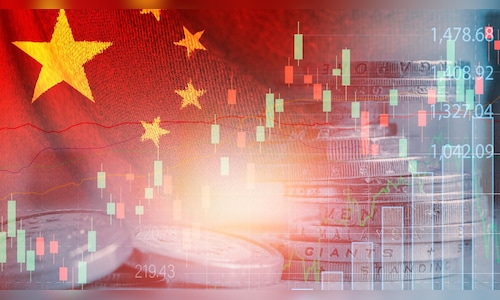Markets will be focused on how Beijing can offset the risk of US tariffs after President Donald Trump threatened another 10% levy. A ramp-up in fiscal spending is expected to be announced at the National People’s Congress to bolster domestic demand, as well as measures to defuse a property crisis and put an end to the deflationary spiral.
Efforts to spur technological advancements — ones that could see the likes of AI start up DeepSeek spring up — will also be crucial. Optimism over artificial intelligence has led Chinese tech stocks in Hong Kong to a three-year high, raising the risk of a sudden selloff if Beijing’s push for innovation disappoints.
Also Read: Can China’s $10 tn savings boost fuel a real recovery this time?
“Higher government spending driven by fiscal deficit expansion and rebounding credit impulse would help alleviate deflationary concerns and add to the ongoing China equity market re-rating,” said George Efstathopoulos, a portfolio manager at Fidelity International. China holds the keys to “rebalance its economy and create more sustainable growth domestically.”
Here are some of the areas closely watched by equity traders and analysts ahead of the meeting that kicks off on Wednesday:
AI Race
The extent of China’s support for AI and other cutting-edge technology will be of major interest after DeepSeek triggered a valuation re-rating of the sector. Investors are expecting measures to “push forward the AI-related investment and adoption,” according to Goldman Sachs Group Inc. economists.
President Xi Jinping’s embrace of major business chiefs — who had once laid low during a regulatory crackdown — suggests the nation will double down on its drive to achieve tech supremacy. Beyond AI, robotics, low-altitude and digital economy sectors may be of focus.
Potential equity market winners include chipmakers such as Hua Hong Semiconductor Ltd., whose shares have risen about 58% in Hong Kong this year. Robotics firms UBTech Robotics Corp. and Shenzhen Inovance Technology Co. have gained more than 60% and 20% each during the period.
Also Read: How Trump’s focus on China trade could hurt India
A further pledge in support for the private sector will benefit China’s top two internet giants Alibaba Group Holding Ltd. and Tencent Holdings Ltd., which have roared back after years of sluggish market performance.
Consumer Demand
Analysts expect that boosting consumption will be a policy priority this year given deflation and trade tensions. Premier Li Qiang recently emphasized the need to shore up consumption as a key driver of growth.
“We need quite expansionary fiscal policy to help circuit break the disinflationary spiral in China and to help inject some demand impetus to the economy,” said Kinger Lau, chief China equity strategist at Goldman Sachs. “The government has talked about supporting consumption, but we need the details.”
Citigroup Inc. analysts see a possible expansion of the trade-in program, which has benefited makers of consumer electronics and measures to increase basic pension benefits. They don’t expect a large-scale child birth subsidy or a universal cash handout, according to a Feb. 14 note.
Policies to revive domestic demand can be a boon for automakers such as BYD Co. and Geely Automobile Holdings Ltd., and home appliance makers including Gree Electric Appliances Inc. and Haier Smart Home Co. Increased support may allow a catch-up rally in onshore Chinese shares, where consumption-driven stocks have a heavier presence.
Property Slump
Details around supporting the housing market will be important as the industry remains soft despite early signs of stabilization. A gauge of property stocks are down 40% from an October high as investor patience wanes.
With the property sector accounting for about 19% of the economy, concerns around the still-sluggish housing market may prevent the stock rally from broadening beyond tech shares.
The Congress is likely to focus on measures to push forward urban village renovation, support housing demand, reasonably control new land supply while seeking more progress in inventory de-stocking, according to a note by UBG Group AG.
Tao Wang, chief China economist at UBS, expects the government to deploy 800 billion yuan ($110 billion) or more of special local government bonds each year for de-stocking, and add credit support for developers’ financing.
Support measures would likely benefit larger state-backed firms including China Vanke Co., China Overseas Land & Investment Ltd. and China Resources Land Ltd.


